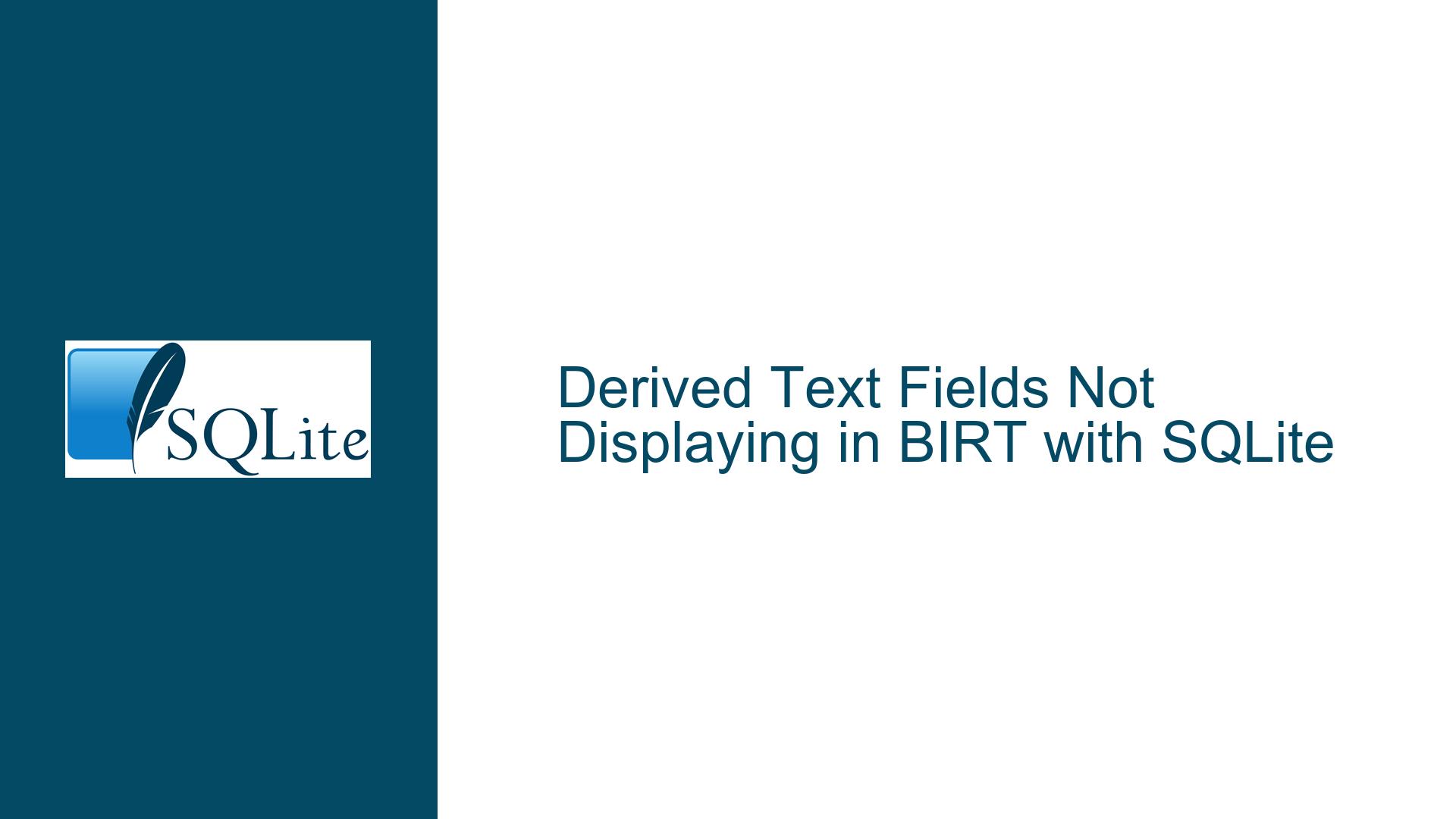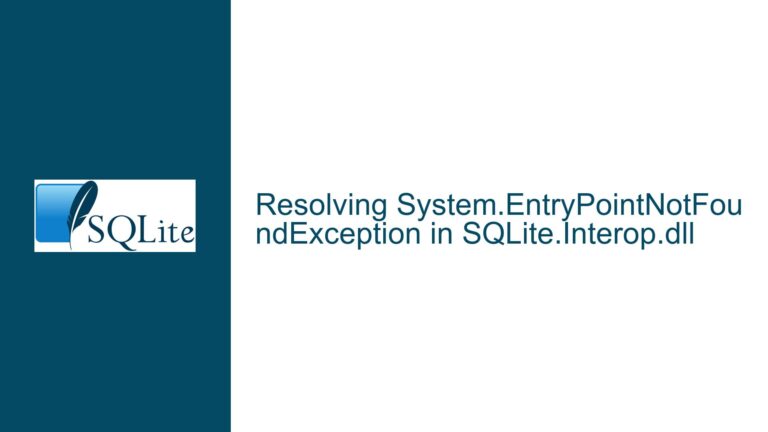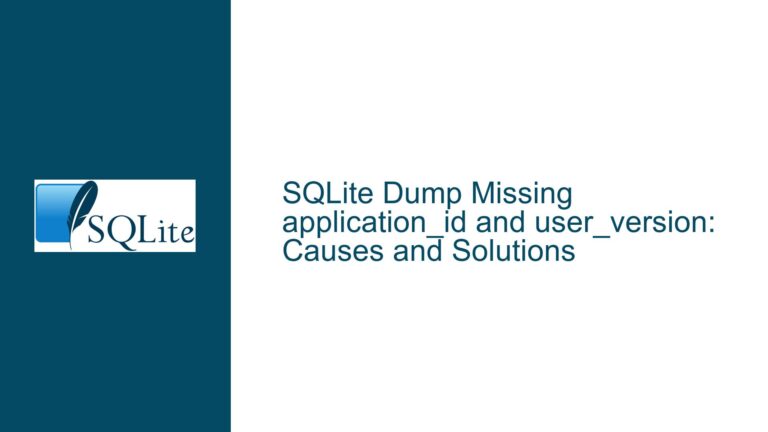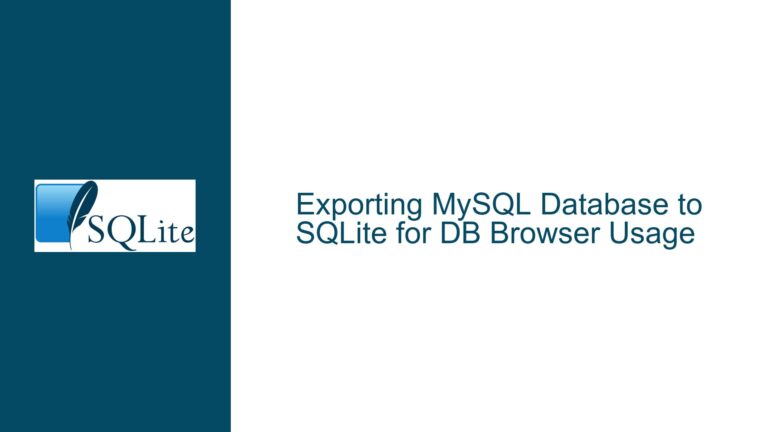Derived Text Fields Not Displaying in BIRT with SQLite
Issue Overview: CAST Function and Data Type Mismatch in BIRT Reports with SQLite
When working with BIRT (Business Intelligence and Reporting Tools) and SQLite, a common issue arises when derived text fields fail to display in the generated reports. This problem is particularly evident when using the CAST function in SQL queries within the BIRT report dataset. The issue manifests when the CAST function is used to convert a string literal to a TEXT data type, but the resulting column is not rendered in the report. However, when the CAST function is used to convert a numeric literal to an INTEGER, the report functions as expected.
The core of the problem lies in the interaction between the SQLite JDBC driver and the BIRT reporting engine. Specifically, the SQLite JDBC driver (org.sqlite.jdbc4.JDBC4ResultSet) appears to return an INTEGER data type for all derived columns, regardless of the actual data type specified in the CAST function. This behavior is inconsistent with other database drivers, such as MySQL, which correctly return the TEXT data type for derived columns. This discrepancy suggests that the SQLite JDBC driver may not be mapping the data types as expected, leading to the failure of derived text fields to display in BIRT reports.
Possible Causes: SQLite JDBC Driver Behavior and BIRT Report Design
The root cause of this issue can be attributed to two primary factors: the behavior of the SQLite JDBC driver and the design of the BIRT report.
1. SQLite JDBC Driver Behavior:
The SQLite JDBC driver (org.sqlite.jdbc4.JDBC4ResultSet) has a peculiar behavior when it comes to handling derived columns. Specifically, it tends to default to the INTEGER data type for any column that is not directly mapped to a table column. This behavior is inconsistent with other database drivers, such as MySQL, which correctly infer the data type based on the CAST function or the literal value. This inconsistency can lead to issues when the BIRT reporting engine attempts to render the derived columns, as it may not correctly interpret the data type returned by the SQLite JDBC driver.
2. BIRT Report Design:
The design of the BIRT report can also contribute to this issue. BIRT relies on the data types returned by the JDBC driver to determine how to render the data in the report. If the JDBC driver returns an incorrect or unexpected data type, BIRT may fail to render the data correctly. In this case, the SQLite JDBC driver’s tendency to default to the INTEGER data type for derived columns can cause BIRT to misinterpret the data, leading to the failure of derived text fields to display.
Additionally, the use of the CAST function in the SQL query can complicate matters. The CAST function is used to explicitly convert a value to a specific data type, but if the JDBC driver does not respect this conversion, the resulting data type may not match what BIRT expects. This mismatch can lead to rendering issues in the report.
Troubleshooting Steps, Solutions & Fixes: Resolving Derived Text Field Display Issues in BIRT with SQLite
To resolve the issue of derived text fields not displaying in BIRT reports when using SQLite, the following troubleshooting steps, solutions, and fixes can be applied:
1. Verify SQLite JDBC Driver Version:
The first step in troubleshooting this issue is to verify the version of the SQLite JDBC driver being used. Older versions of the driver may have bugs or limitations that could contribute to the problem. Ensure that you are using the latest version of the SQLite JDBC driver, as newer versions may have addressed issues related to data type mapping.
2. Modify the SQL Query:
One potential solution is to modify the SQL query to avoid using the CAST function for text literals. Instead of using CAST('sqlite' AS TEXT), you can directly use the string literal in the query. For example:
SELECT 'sqlite' AS NAME, FIRST_NAME FROM USER_INFO;
This approach eliminates the need for the CAST function and ensures that the SQLite JDBC driver correctly interprets the data type as TEXT.
3. Use CHAR Instead of TEXT:
If modifying the query to remove the CAST function is not feasible, another approach is to use the CHAR data type instead of TEXT in the CAST function. For example:
SELECT CAST('sqlite' AS CHAR) AS NAME, FIRST_NAME FROM USER_INFO;
This approach may help the SQLite JDBC driver correctly map the data type, as CHAR is a more specific data type than TEXT.
4. Ensure Case Sensitivity in SQL Keywords:
Another potential issue is the case sensitivity of SQL keywords. In some cases, the SQLite JDBC driver may not correctly interpret the CAST function if the keywords are not in lowercase. Ensure that the CAST and AS keywords are in lowercase, as shown in the following example:
SELECT cast('sqlite' as CHAR) AS NAME, FIRST_NAME FROM USER_INFO;
This approach ensures that the SQLite JDBC driver correctly interprets the CAST function.
5. Avoid Aliasing Derived Columns:
In some cases, aliasing derived columns can cause issues with data type mapping. If possible, avoid assigning an alias to the derived column. For example:
SELECT cast('sqlite' as CHAR), FIRST_NAME FROM USER_INFO;
This approach may help the SQLite JDBC driver correctly interpret the data type of the derived column.
6. Custom Data Type Mapping:
If the above solutions do not resolve the issue, consider implementing custom data type mapping in the BIRT report. BIRT allows you to define custom data type mappings for specific columns in the dataset. By explicitly defining the data type for the derived column as TEXT, you can ensure that BIRT correctly renders the data.
7. Consult BIRT Documentation and Community:
If the issue persists, consult the BIRT documentation and community for additional guidance. The BIRT documentation may provide insights into how to handle data type mapping issues, and the BIRT community may have encountered and resolved similar issues in the past.
8. Consider Alternative Database Drivers:
If the issue is specific to the SQLite JDBC driver, consider using an alternative JDBC driver for SQLite. Some third-party JDBC drivers may have better support for data type mapping and may resolve the issue.
9. Debugging and Logging:
Enable debugging and logging in both the SQLite JDBC driver and the BIRT reporting engine to gather more information about the data type mapping process. This information can help identify the root cause of the issue and guide further troubleshooting efforts.
10. Update BIRT Version:
Ensure that you are using the latest version of BIRT, as newer versions may have addressed issues related to data type mapping and rendering. Updating to the latest version of BIRT may resolve the issue.
By following these troubleshooting steps, solutions, and fixes, you can resolve the issue of derived text fields not displaying in BIRT reports when using SQLite. The key is to ensure that the SQLite JDBC driver correctly maps the data types and that the BIRT reporting engine correctly interprets the data types returned by the driver.






